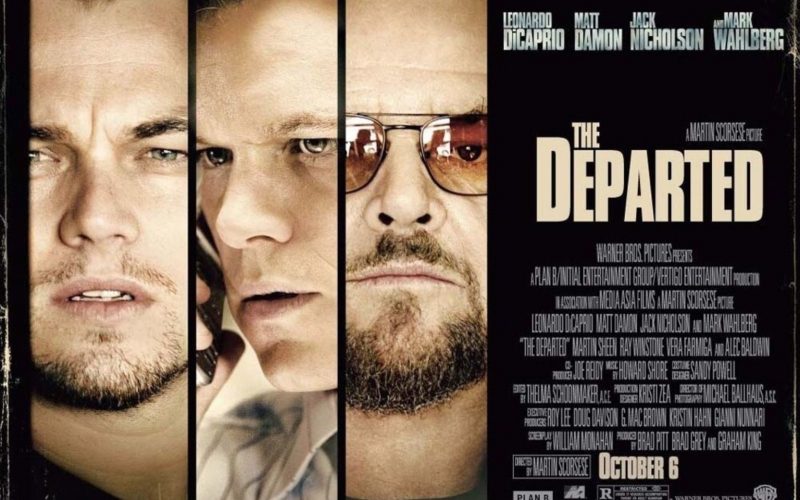The Departed (2006).
It seemed almost inevitable that Martin Scorsese would one day win an Oscar. This is the man who made Mean Streets, Taxi Driver, Raging Bull, Goodfellas and many more. He is revered as being one of the greatest directors of the last fifty years and has inspired countless filmmakers and cinephiles with his skill, dedication to the craft, knowledge of film history, and the efforts he’s made in the preservation of film, and raw power that speaks of the streets in a way that is both entertaining and profound.
It is ironic however that the film that won him this coveted prize wasn’t one of his recognised classics, but one of the few genre films he’s made. Released in 2006, The Departed is a remake of the 2002 Hong Kong film Infernal Affairs (directed by Andrew Lau & Alan Mak). The story is, in many respects, pure 1980s high concept. On the one side, we have the police who have an undercover cop in a criminal gang. At the same time this criminal gang has a mole in the police department. Can the good guys stop the criminals and expose the mole before their man is exposed himself?
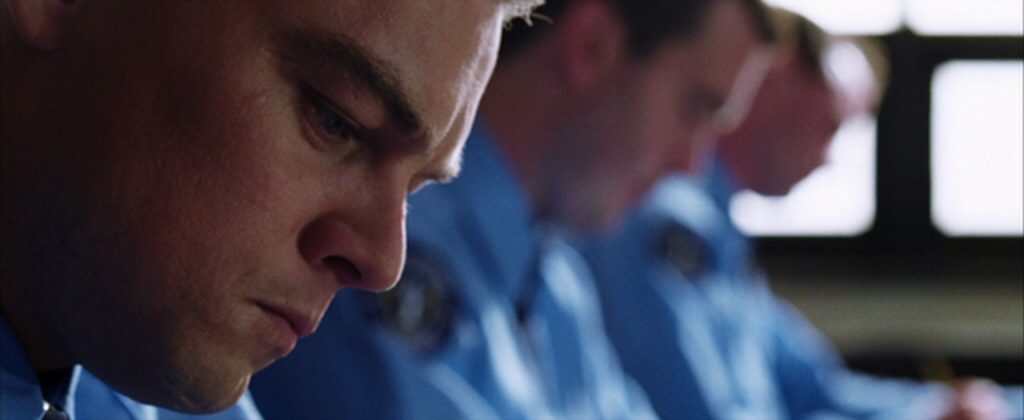
Infernal Affairs is an great example of all that’s great in Hong Kong cinema. It’s a successor to the great films that Hong Kong produced from the late 1980s and into the 1990s. Films like John Woo’s The Killer and Hard Boiled, or Ringo Lam’s fantastic thriller City On Fire. It’s slick, action-packed and not the type of film you would usually associate with Martin Scorsese.
In fact, it seemed like an odd choice of film for the director to be interested in and, perhaps inevitably, major changes were made as the story crossed the Pacific Ocean. Writer William Monahan took the basic premise – which does not change from the original – and transfers the film to Boston. The criminal gang is headed by Francis “Frank” Costello, played with customary delight and relish by Jack Nicholson in what may be his last great role.
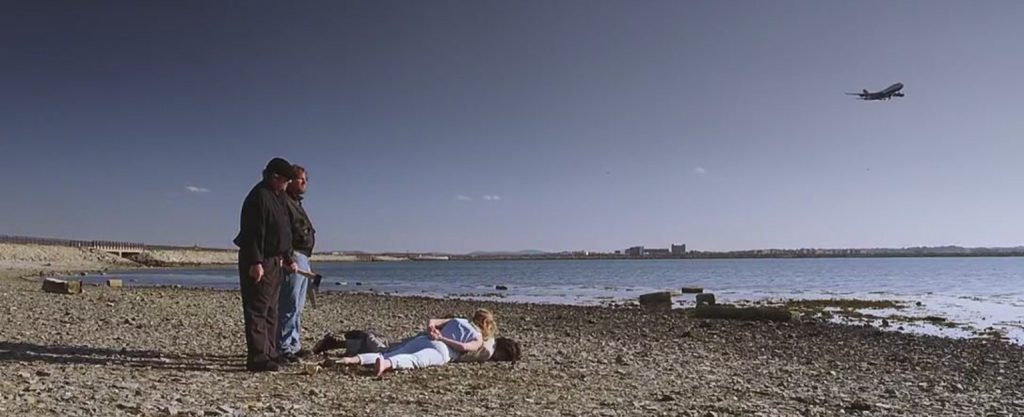
Costello was based on James “Whitey” Bulger, the Bostonian Gangster who had hit the headlines 10 years before the film was made. Bulger was a well-known figure in Boston and the surrounding areas, especially in the city of Somerville where he lived and operated from. When the news broke that he was a criminal, the local populace was shocked as he had appeared respectable, a member of the community who contributed to local societies, helping out those who needed a helping hand. He was also an FBI Informer who was working very closely with Agent John Connolly. Connolly had supposed to have been handling an informant, however their relationship was much closer than that. They shared information, helping each other out when they needed it and it was Connolly who tipped off Bulger to the fact that a RICO indictment was pending, allowing him to escape and to go on the run.
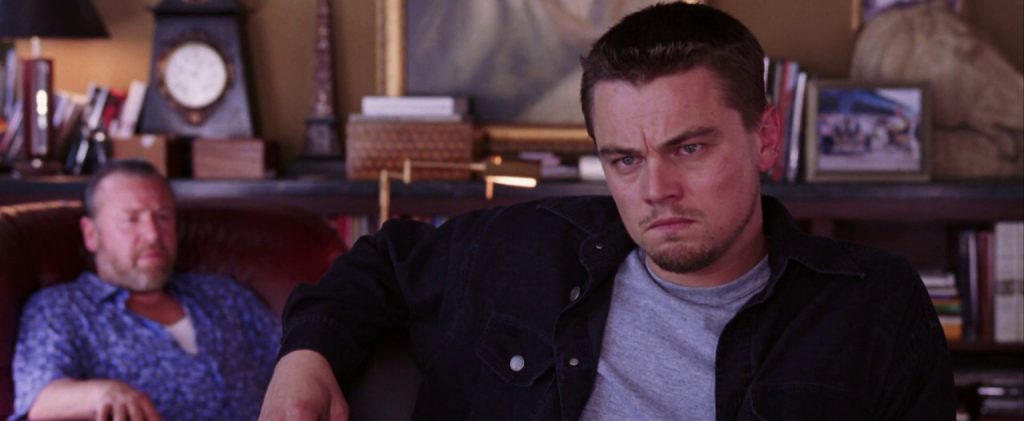
The mob’s mole in the police department is Colin Sullivan. It was a role that was originally intended for Brad Pitt who declined as he thought he was too old for the character. The role then went to Matt Damon, with Pitt staying on as a producer. The other lead – the undercover cop, Billy Costigan – is played by Leonardo DiCapriomin his third collaboration with Scorsese (previously they had worked together on Gangs of New York and The Aviator).
Rounding out a very impressive cast are Martin Sheen as Capt. Oliver Queenan, the man in charge of the undercover operation; Mark Wahlberg in a career-best performance as Sean Dignam, Queenan’s foul mouthed and abrasive deputy; Ray Winstone as Arnold French, Costello’s second in command, and Alec Baldwin as Capt. George Ellerby, the man in charge of the operation to take down Costello. Colin Sullivan begins as a member of Ellerby’s team before being tasked with finding out the identity of the mole.
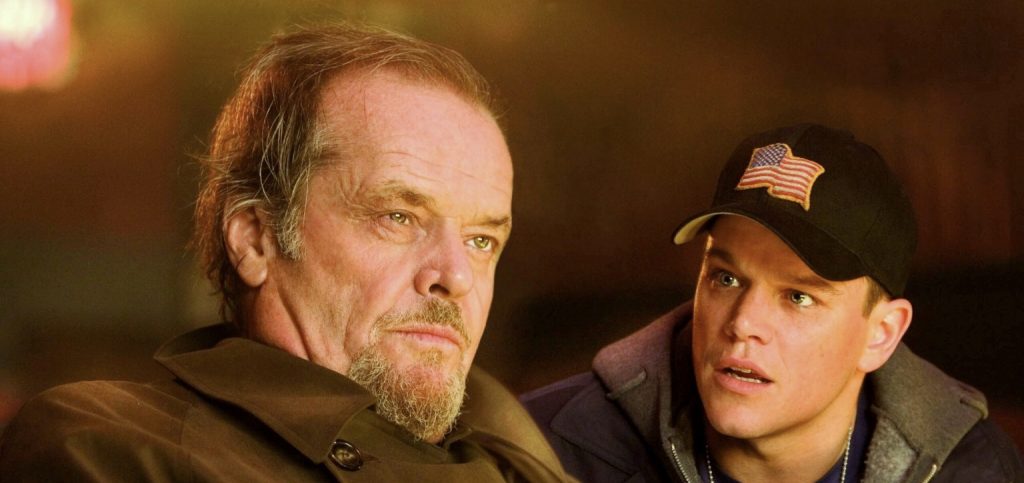
Despite the fact that The Departed is, unlike many Scorsese films, plot rather than character-driven, it’s easy to see the director’s influence on the subject matter. The main strength is its sense of place. From the streets to the accents, we get a real sense of where we are. Although this story could easily have been set in any city in the world, it does come across as distinctly Bostonian. Both the Police and the mob are families, which extend into the local communities. People are judged by the street they grew up on and on the integrity of their fathers, and limits are imposed on them based on these things. The Catholic Church is constantly in the background, whether it’s a Priest and a couple of Nuns eating in the local diner, to what Roger Ebert has described as ‘an examination of conscience, when you stay up all night trying to figure out a way to tell the priest: I know I done wrong, but, oh, Father, what else was I gonna do?’
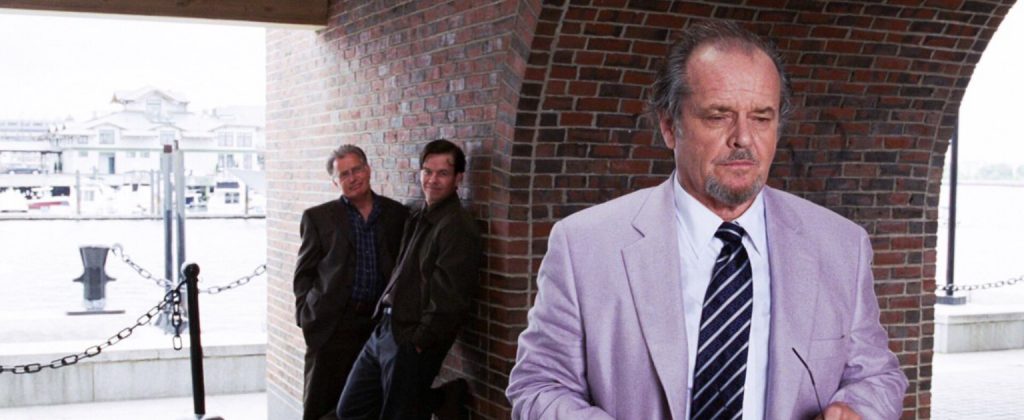
Matt Damon, who is a Bostonian himself, plays Sullivan as someone brimming with confidence. He wants everything that the Police Force can offer him, the only threat coming from the reason he started on the force in the first place – the criminals he ultimately works for. DiCaprio’s character is the opposite. Whilst undercover his sense of identity has been eroding. There are only two people in the world who knows his real identity – Queenan and Ginham – and he wants nothing more than to get back to being ‘real police’.
Like many Scorsese films (Taxi Driver, Raging Bull, The Age Of Innocence), a central theme of The Departed is that of identity. We often take for granted who we are because it’s reinforced every day. And it’s not simply who we are, but who we want to be and how precarious and insecure our identity is. Sullivan is comfortable in his new identity and is happy for it to define him, whereas Costigan is under constant threat and stress and wants to get his old identity back.
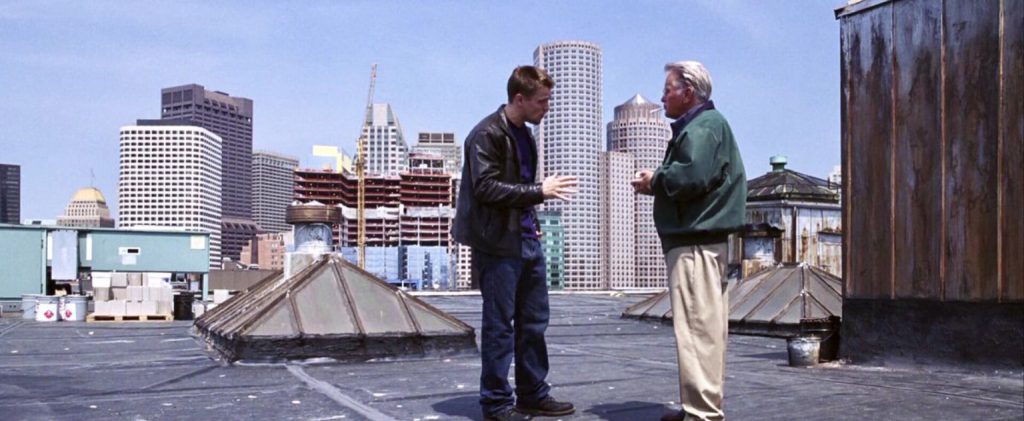
It’s not only the central characters who are questioning their identity – any film about undercover cops and moles is going to feature conversations questioning each other’s motivations and one of the main motifs in The Departed is that of rats. Costello mentions them multiple times and draws pictures of rodents when talking to Costigan, and the final shot of the film features a rat scurrying across a window ledge. This particular shot hasn’t been very well received by some and one person launched a Kickstarter campaign to raise money to have the rat removed from the film. Whilst it may be a little heavy-handed, I see the humour in it (whether intentional or not) and chuckle each time I see it.
There’s a great deal of tension in the film, especially in the scenes where Costigan and Costello face off against each other. This propels the film along at a breakneck speed and there are multiple edge of seat moments of tension.
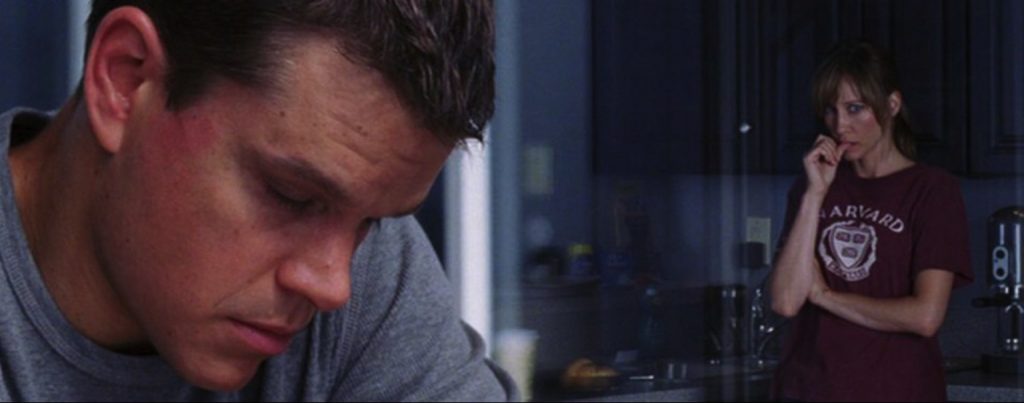
Scorsese really does seem to be enjoying himself here. He uses a wide range of techniques including sweeping camera movements, irises, surreal lighting all coupled with some fantastic editing from the great Thelma Schoonmaker. He has spoken of how he was inspired by the classic gangster movies that came out of Warner Brothers in the ‘30s. One example is the homage to Howard Hawks’ Scarface (1932). In that film, every time Antonio “Tony” Camonte (Paul Muni) shoots someone, there is an ‘X’ somewhere in the picture. Scorsese repeats this in a variety of ways. When one character is thrown off the top of a building and the camera tracks the fall, the windows in the background have X’s taped on them. In the finale, scaffolding and beams crisscross behind the characters. This may not be something the casual viewer will notice but these little Easter eggs do provide added pleasure for the more observant of cinephiles.
If there is a weakness here it’s Madolyn (Vera Farmiga). She’s Sullivan’s girlfriend who initially acts as Costigan’s therapist before they develop a relationship themselves. This seems a tad too contrived, a way of making the tangled web that has been spun even messier. She could have been a moral core, a stable identity in all the confusion but this is hinted upon during their conversations but left underdeveloped.
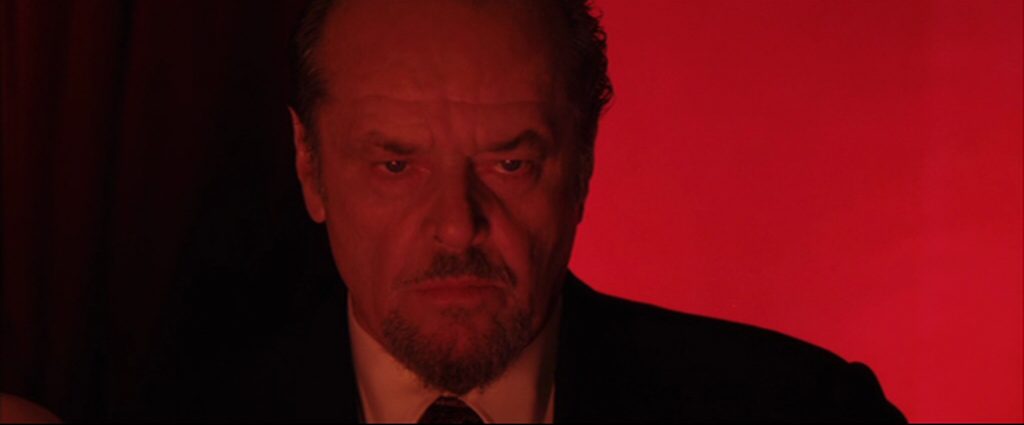
The Departed was a tremendous success for Scorsese. It grossed $291.5 million at the Box Office and was a critical hit. Roger Ebert, a long-time fan and supporter of Scorsese, named it his fourth best film of the year and his At The Movies TV show co-host Richard Roeper put it at number one, as did Rollings Stones’ Peter Travers. It won Best Picture at the Golden Globes and won Four Oscars – Best Picture, Best Director for Scorsese, Best Film Editing (Thelma Schoonmaker), and Best Adapted Screenplay (William Monahan).
Andrew Lau, the director of Infernal Affairs, was complimentary, if not completely bowled over, saying, “Of course I think the version I made is better, but the Hollywood version is pretty good too. [Scorsese] made the Hollywood version more attuned to American culture.”
This cuts right to the core of the difference between the two films. Many remakes of International movies are often the same movie only in a different language, but Infernal Affairs and The Departed are different beasts. Although the central story and some scenes are the same, they each reflect their own cultures. This makes The Departed relevant when so many remakes are not. Scorsese is too good a director not to make a film his own and there is no reason to choose between the two films, but accept them as individuals.
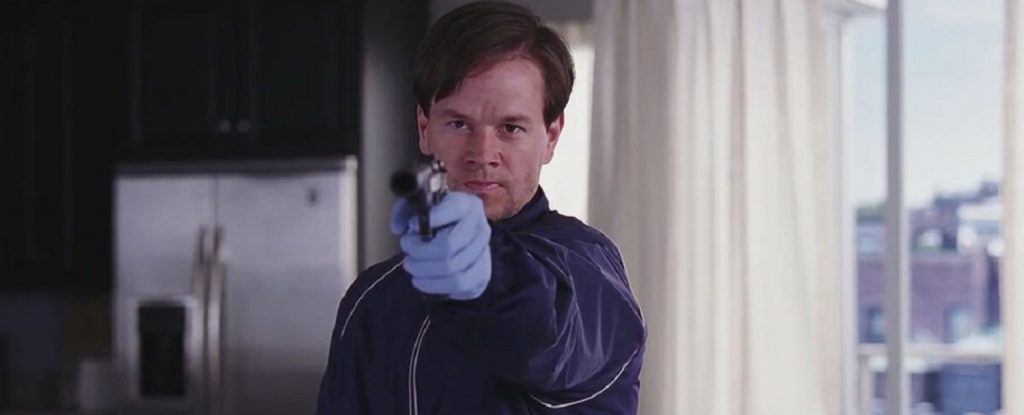
The Departed may not be the very best of Scorsese’s output, but if it hadn’t been made by Scorsese it would be considered one of the best films of the 21st Century. That it is, we can’t help but compare it to a back catalogue that includes so many undisputed classics. What this does is reinforce the idea that Scorsese is an auteur. For us fans, it continues themes and preoccupations (religion, identity, community, violence) that have long kept us interested throughout his remarkable career.
Film ‘89 Verdict – 8/10

